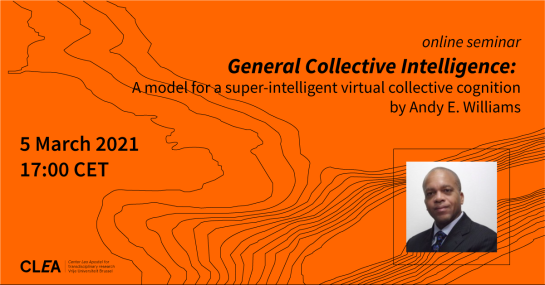Andy E. Williams will give a short overview of his work in General Collective Intelligence, including how the model was derived using Human-Centric Functional Modeling, how GCI and HCFM relate to the evolution of complexity, consciousness, cognition and some other areas focused on by CLEA, as well as providing an overview of his planned next steps.
Abstract:A General Collective Intelligence or GCI is a hypothetical platform that combines groups into a virtual collective cognition with a single well-defined thread of collective reasoning [1]. Artificial Intelligence is to Collective Intelligence (CI) what Artificial General Intelligence (AGI) is to General Collective Intelligence. Since an entity with a well-defined cognition with it's own independent thread of reasoning must behave as an independent actor, GCI is a radically different concept from CI solutions, which are essentially collective decision-making tools controlled by some subset of actors within or outside the group. While the term "collective cognition" is frequently used to indicate some innate capabilities of groups of humans, animals, or organizations, in this context it is a platform that provides groups with the capacity to navigate collective reasoning processes coherently. Where CItools cannot be reliably separated from being aligned with the interests of their designers, owners, and other decision-makers, being driven by the collective cognition a GCI platform must reliably be aligned with the collective interests of the group. GCI platforms define the cooperation infrastructure required to self-assemble into massive networks of cooperation for any purpose [2], where that cooperation might exponentially increase intelligence [3] and ability to achieve impact over that of any individual.
Bio:Andy E. Williams, founder of the Nobeah Foundation, is a social entrepreneur focused on understanding the equations underlying human challenges, so that by changing those equations, the problems solve themselves. His research on how to overcome the problem of decision-making systems within international development that don’t reliably select the best solutions led to development of a model of General Collective Intelligence or GCI, a virtual collective cognition that organizes groups in a way that create the potential for exponentially greater general problem-solving ability than any individual in the group. The theory behind this model of group cognition suggests that entire classes of problems can't reliably be solved without a GCI or equivalent system due to systematic bugs or features of decision-making in the absence of GCI. GCI enables individuals to self-assemble to execute self-organized processes. For “collective optimization” problems in which an optimal collective outcome is achieved by optimizing outcomes for each individual, GCI decentralizes processes so that outcomes are aligned with collective interests, as opposed to any other decision-making system in which processes and participants are free to become aligned with the interests of a centralized process owner, process designer, or other decision-maker. Collective optimization problems include entire categories of "wicked problems" in sustainable development.

More about CLEA seminars here.
